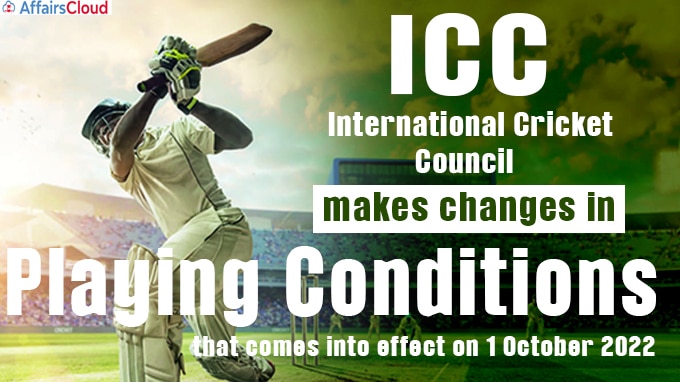 On 20 September 2022, International Cricket Council (ICC) has announced a lot of changes to its ‘playing conditions’ with an effect from October 2022, which means the upcoming ICC Men’s T20 World Cup in Australia will enforce the news rules.
On 20 September 2022, International Cricket Council (ICC) has announced a lot of changes to its ‘playing conditions’ with an effect from October 2022, which means the upcoming ICC Men’s T20 World Cup in Australia will enforce the news rules.
- ICC has announced its Playing Conditions in Marylebone Cricket Club (MCC)’s updated 3rd Edition of the 2017 Code of the Laws of Cricket after the Chief Executives’ Committee (CEC) approved recommendations from Sourav Ganguly, Chairman of the ICC Men’s Cricket Committee.
- The recommendations also discussed with Clare Connor, Chairman of the ICC Women’s Cricket Committee to implement in Women’s Team.
The Main Changes to the Playing Conditions are:
i.Batters returning when caught: When a batter is out Caught, the new batter will come in at the end the striker was, regardless of whether the batters crossed prior to the catch being taken.
- Previously, in case the batters crossed before a catch was taken, the non-striker would take strike the next ball while the new batter would be at the non-striker’s end.
ii.Use of saliva to polish the ball: This prohibition has been implemented already for over two years in international cricket as a Covid-related temporary measure and it is considered appropriate for the ban to be made permanent.
iii.Incoming batter ready to face the ball : An incoming batter should be ready to take the strike within 2 minutes in Tests and One Day International (ODIs), while the current timing of 90 seconds in Twenty20 International (T20Is) remains unchanged.
- Previously, the incoming batter had three minutes to take strike in ODIs and Tests but it has now been reduced. Failing to do so, the fielding captain can appeal for timed out.
iv.Bowler throwing towards striker’s end before delivery: Previously, a bowler who saw the batter advancing down the wicket before entering their delivery stride, could throw the ball to attempt to Run out the striker. This practice will now be called a Dead ball.
v.Striker’s right to play the ball :This is restricted so as to require some part of their bat or person to remain within the pitch. Should they venture beyond that, the umpire will call and signal Dead ball. Any ball which would force the batter to leave the pitch will also be called No ball.
vi.Unfair movement by the fielding side: Any unfair and deliberate movement while the bowler is running in to bowl could now result in the umpire awarding five penalty runs to the batting side, in addition to a call of Dead ball.
vii.Running out of the non-striker: The Playing Conditions follow the Laws in moving this method of effecting a Run out from the ‘Unfair Play’ section to the ‘Run out’ section.
- Previously looked down as unfair play, running out a non-striker for backing up too much will now be considered as a regular run-out.
Click here for the details of the new rules
Other Major Decisions:
i. In January 2022, the in-match penalty introduced in T20Is will also be adopted in ODI matches after the completion of the ICC Men’s Cricket World Cup Super League in 2023.
- In-match penalty for slow over rate: What is it? – If the bowling team fails to bowl the first ball of the final over of their innings within the stipulated time, they will lose one fielder from outside of the 30-yard circle for the remainder of the innings.
ii. ICC decided that the playing conditions for all men’s and women’s ODI and T20I matches will be amended to allow hybrid pitches to be used if agreed by both teams.
iii. Currently, hybrid pitches can only be used in women’s T20I matches.
About International Cricket Council (ICC) :-
- Chairman – Greg Barclay
- Chief Executive Officer (CEO) – Geoff Allardice
- Established in -1909
- Headquarters – Dubai, United Arab Emirates




